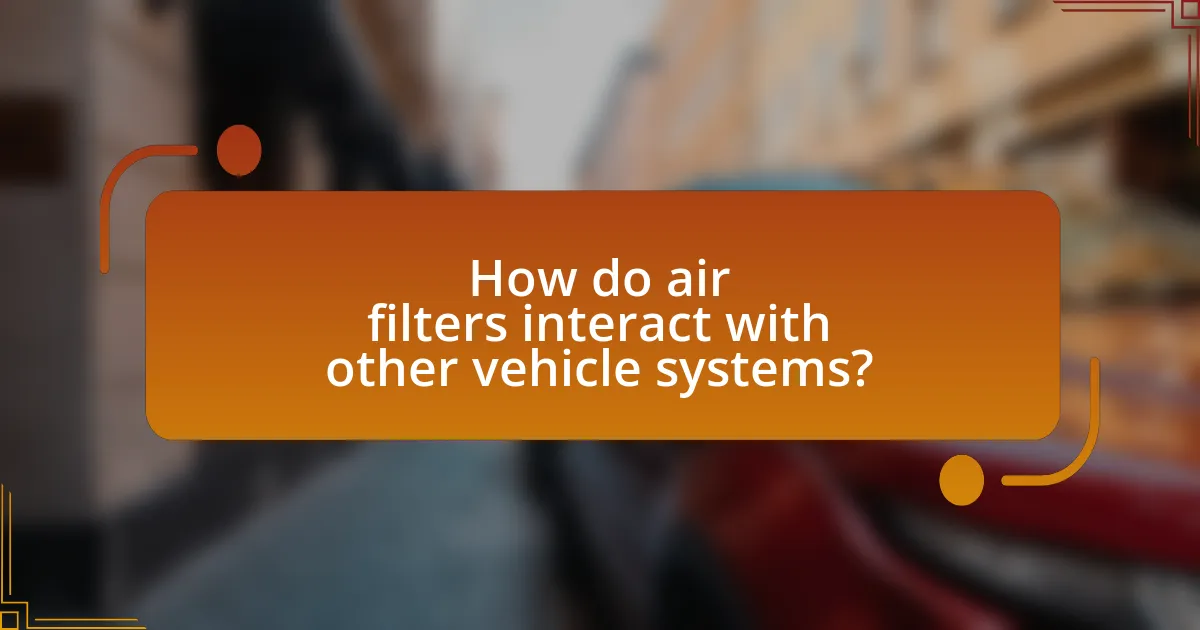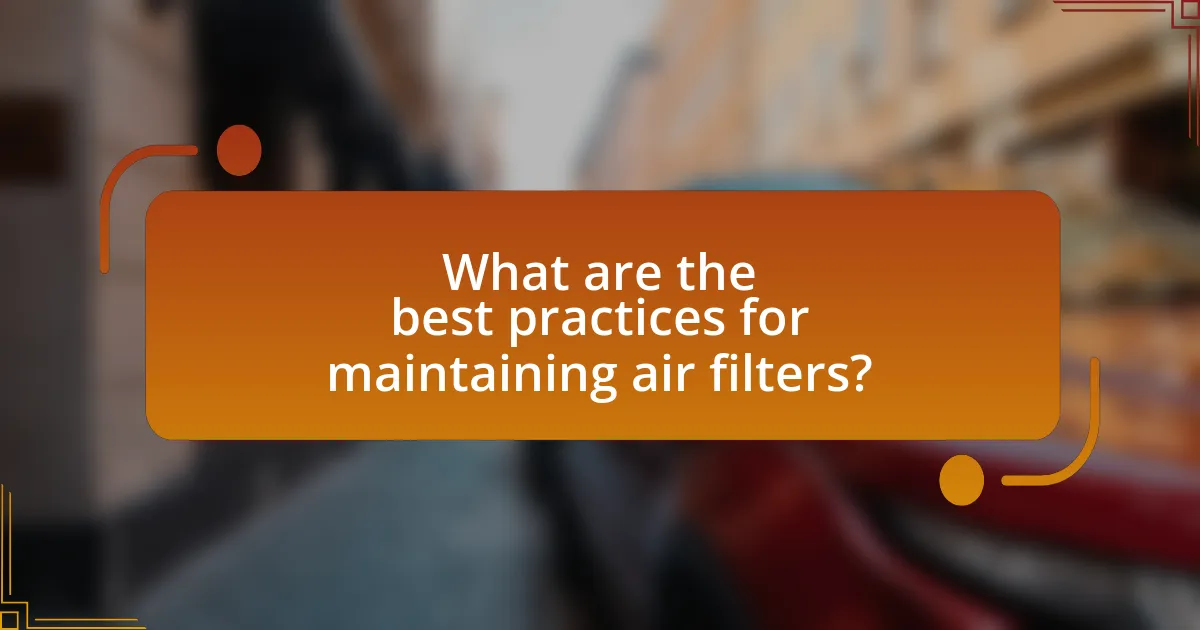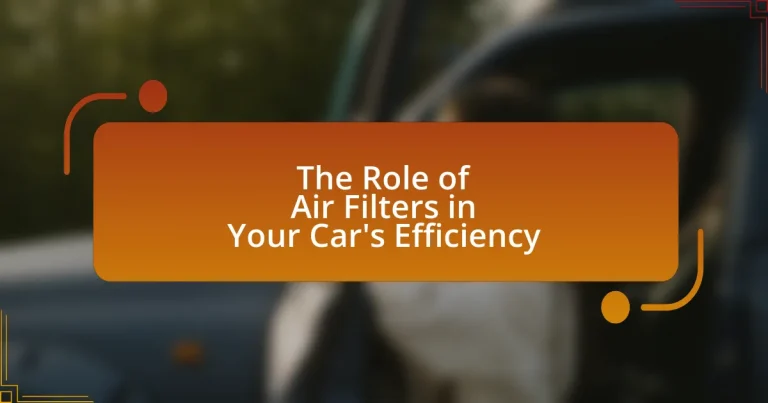Air filters are essential components in a vehicle that significantly impact its efficiency and performance. They ensure that the engine receives clean air for optimal combustion, which can enhance fuel efficiency by up to 10% and reduce harmful emissions. The article explores the various types of air filters, their role in engine performance, and the importance of regular maintenance and timely replacement to prevent issues such as reduced fuel economy and increased emissions. Additionally, it discusses how driving conditions affect air filter lifespan and offers best practices for maintaining air filters to maximize vehicle efficiency.
What is the role of air filters in your car’s efficiency?
Air filters play a crucial role in enhancing a car’s efficiency by ensuring that the engine receives clean air for optimal combustion. Clean air filters prevent dirt and debris from entering the engine, which can lead to improved fuel efficiency and reduced emissions. According to the U.S. Department of Energy, a clean air filter can improve a vehicle’s gas mileage by as much as 10%. This efficiency is vital for maintaining engine performance and longevity, as contaminants can cause wear and tear on engine components.
How do air filters contribute to engine performance?
Air filters contribute to engine performance by ensuring that only clean air enters the engine, which is essential for optimal combustion. Clean air allows for a more efficient fuel-air mixture, leading to improved power output and fuel efficiency. According to a study by the Society of Automotive Engineers, a clean air filter can enhance engine performance by up to 10%, as it reduces the risk of contaminants that can cause engine wear and decrease efficiency.
What types of air filters are commonly used in vehicles?
The types of air filters commonly used in vehicles include engine air filters, cabin air filters, and fuel filters. Engine air filters prevent dirt and debris from entering the engine, ensuring optimal performance and fuel efficiency. Cabin air filters clean the air entering the vehicle’s interior, improving air quality for passengers. Fuel filters remove contaminants from the fuel before it reaches the engine, protecting fuel injectors and enhancing engine performance. These filters are essential for maintaining vehicle efficiency and longevity.
How does the design of an air filter affect airflow?
The design of an air filter significantly affects airflow by determining the filter’s resistance to air passage. A well-designed air filter optimizes airflow by balancing filtration efficiency with minimal resistance, allowing for adequate air intake while trapping contaminants. For instance, filters with larger surface areas or pleated designs enhance airflow by providing more pathways for air to pass through, reducing the likelihood of clogging. Conversely, filters that are too dense or poorly designed can restrict airflow, leading to decreased engine performance and efficiency. Studies have shown that air filters with optimal design can improve engine efficiency by up to 10%, demonstrating the critical role of design in maintaining proper airflow.
Why are clean air filters important for fuel efficiency?
Clean air filters are crucial for fuel efficiency because they ensure optimal airflow to the engine, allowing it to mix air and fuel effectively. When air filters are clogged or dirty, they restrict airflow, leading to a richer fuel mixture that can decrease combustion efficiency and increase fuel consumption. Studies indicate that a clean air filter can improve fuel efficiency by as much as 10%, as it allows the engine to operate at its designed performance level.
What impact does a clogged air filter have on fuel consumption?
A clogged air filter negatively impacts fuel consumption by restricting airflow to the engine, leading to a decrease in engine efficiency. When the engine receives insufficient air, it cannot mix fuel and air optimally, resulting in incomplete combustion and increased fuel usage. Studies indicate that a clogged air filter can reduce fuel efficiency by up to 10%, as the engine compensates for the lack of air by using more fuel to maintain power output. This relationship highlights the importance of regular air filter maintenance for optimal vehicle performance and fuel economy.
How often should air filters be replaced to maintain efficiency?
Air filters should be replaced every 12,000 to 15,000 miles to maintain efficiency. Regular replacement ensures optimal airflow and engine performance, as clogged filters can reduce fuel efficiency by up to 10%. This recommendation is supported by automotive maintenance guidelines and manufacturers’ specifications, which emphasize the importance of clean air filters for overall vehicle efficiency.
What are the signs of a failing air filter?
The signs of a failing air filter include reduced engine performance, decreased fuel efficiency, and unusual engine noises. When an air filter is clogged, it restricts airflow to the engine, leading to a noticeable drop in power and acceleration. Additionally, a dirty air filter can cause the engine to consume more fuel, resulting in lower miles per gallon. Furthermore, if the air filter is failing, it may produce a whistling or hissing sound due to restricted airflow. These indicators are critical for maintaining optimal vehicle performance and efficiency.
What symptoms indicate that an air filter needs replacement?
Symptoms indicating that an air filter needs replacement include reduced engine performance, decreased fuel efficiency, and unusual engine noises. When the air filter is clogged, it restricts airflow to the engine, leading to a noticeable drop in power and acceleration. Additionally, a dirty air filter can cause the engine to consume more fuel, resulting in lower miles per gallon. Furthermore, if the engine produces a rough idle or misfires, it may signal that the air filter is obstructed. Regular inspection and timely replacement of the air filter can prevent these issues and maintain optimal vehicle performance.
How can a dirty air filter affect vehicle emissions?
A dirty air filter can significantly increase vehicle emissions by restricting airflow to the engine, leading to incomplete combustion of fuel. When the engine does not receive enough air, it compensates by injecting more fuel, which results in higher levels of unburned hydrocarbons and carbon monoxide being released into the atmosphere. Studies indicate that a clogged air filter can reduce engine efficiency by up to 10%, directly correlating with increased emissions. This inefficiency not only harms the environment but can also lead to potential regulatory non-compliance for vehicle emissions standards.

How do air filters interact with other vehicle systems?
Air filters interact with other vehicle systems by ensuring that clean air enters the engine, which is crucial for optimal combustion and performance. The engine management system relies on accurate air intake measurements to adjust fuel delivery, thereby maintaining the correct air-fuel ratio for efficient combustion. When air filters are clogged or dirty, they restrict airflow, leading to reduced engine efficiency, increased fuel consumption, and potential damage to components like the mass airflow sensor. Studies indicate that a clean air filter can improve engine performance by up to 10%, highlighting the importance of this interaction in maintaining overall vehicle efficiency.
What role do air filters play in the overall health of the engine?
Air filters play a crucial role in maintaining the overall health of an engine by ensuring that only clean air enters the combustion chamber. Clean air is essential for optimal combustion, which directly affects engine performance, fuel efficiency, and emissions. When air filters are clogged or dirty, they restrict airflow, leading to incomplete combustion, reduced power output, and increased fuel consumption. Studies indicate that a clean air filter can improve engine efficiency by up to 10%, highlighting its importance in engine longevity and performance.
How do air filters influence the performance of the fuel injection system?
Air filters significantly influence the performance of the fuel injection system by ensuring that only clean air enters the engine, which is crucial for optimal combustion. When air filters are clogged or dirty, they restrict airflow, leading to a rich fuel mixture that can cause incomplete combustion, reduced engine efficiency, and increased emissions. Studies show that a clean air filter can improve fuel economy by up to 10%, as it allows the fuel injection system to operate more effectively by maintaining the correct air-to-fuel ratio. This optimal ratio is essential for maximizing power output and minimizing fuel consumption, thereby enhancing overall vehicle efficiency.
What is the relationship between air filters and the vehicle’s exhaust system?
Air filters and the vehicle’s exhaust system are interconnected components that influence engine performance and emissions. The air filter ensures that clean air enters the engine for combustion, which is essential for optimal fuel efficiency and power output. When the air filter is clogged or dirty, it restricts airflow, leading to incomplete combustion and increased exhaust emissions. This inefficiency can cause the exhaust system to work harder to manage the higher levels of unburned fuel and pollutants, potentially leading to damage or failure of components like the catalytic converter. Therefore, maintaining a clean air filter is crucial for the effective functioning of the exhaust system and overall vehicle efficiency.
How do different driving conditions affect air filter performance?
Different driving conditions significantly affect air filter performance by influencing the amount and type of contaminants that the filter must capture. For instance, driving in urban areas with heavy traffic exposes the air filter to higher levels of pollutants such as dust, soot, and exhaust particles, leading to quicker clogging and reduced airflow. Conversely, driving in rural or less polluted environments may result in a slower accumulation of debris, allowing the air filter to maintain its efficiency for a longer period. Studies indicate that air filters can lose up to 20% of their efficiency when clogged, which can negatively impact engine performance and fuel efficiency. Therefore, the driving environment directly correlates with the frequency of air filter maintenance and replacement.
What impact does driving in urban areas have on air filter lifespan?
Driving in urban areas significantly reduces air filter lifespan due to higher levels of particulate matter and pollutants. Urban environments typically have increased traffic congestion, which leads to more stop-and-go driving, resulting in greater accumulation of dust, soot, and other contaminants in the air. Studies indicate that vehicles in urban settings can experience a 20-30% shorter air filter lifespan compared to those driven in rural areas, primarily because urban air contains more harmful particles that clog filters more quickly. This accelerated degradation necessitates more frequent air filter replacements to maintain optimal engine performance and efficiency.
How does off-road driving influence air filter maintenance needs?
Off-road driving significantly increases air filter maintenance needs due to the exposure to higher levels of dust, dirt, and debris. Vehicles operating in off-road conditions encounter harsher environments, which leads to faster clogging of air filters compared to those used primarily on paved roads. Research indicates that off-road vehicles can require air filter changes as frequently as every 15,000 miles, whereas standard vehicles may only need changes every 30,000 to 50,000 miles under normal driving conditions. This increased frequency is essential to maintain optimal engine performance and efficiency, as a clogged air filter restricts airflow, leading to reduced power and fuel efficiency.

What are the best practices for maintaining air filters?
Regularly replacing air filters is the best practice for maintaining air filters in vehicles. Air filters should be checked every 12,000 to 15,000 miles or as recommended by the vehicle manufacturer to ensure optimal airflow and engine performance. Dirty air filters can reduce engine efficiency by restricting airflow, leading to decreased fuel economy and increased emissions. According to the U.S. Department of Energy, replacing a clogged air filter can improve acceleration time by up to 6-11%. Additionally, cleaning reusable air filters according to the manufacturer’s guidelines can extend their lifespan and maintain performance.
How can you effectively clean or replace air filters?
To effectively clean or replace air filters, first, locate the air filter compartment in your vehicle, which is typically found near the engine or in the cabin. Remove the old filter by unclipping or unscrewing it, then either clean it by gently tapping out dust and debris or replace it with a new filter that meets the manufacturer’s specifications. Regular maintenance, such as checking the air filter every 12,000 to 15,000 miles, can enhance engine performance and fuel efficiency, as a clean filter allows for optimal airflow and reduces strain on the engine.
What tools are needed for air filter maintenance?
To maintain air filters, essential tools include a screwdriver, a vacuum cleaner with a brush attachment, and a clean cloth. The screwdriver is necessary for removing the air filter cover, while the vacuum cleaner helps to remove dust and debris from the filter and surrounding area. A clean cloth is useful for wiping down surfaces to ensure optimal air flow. Regular maintenance of air filters can improve engine efficiency and prolong the life of the vehicle, as clean filters allow for better air intake and fuel combustion.
How can you determine the right type of air filter for your vehicle?
To determine the right type of air filter for your vehicle, consult your owner’s manual for specifications and recommendations. The manual typically provides details on the correct filter type, including dimensions and material requirements, ensuring compatibility with your vehicle’s engine. Additionally, consider factors such as driving conditions and climate, as these can influence filter performance; for example, vehicles driven in dusty environments may benefit from high-efficiency filters. Using the correct air filter type is crucial, as it directly affects engine performance and fuel efficiency, with studies indicating that a clean air filter can improve fuel economy by up to 10%.
What tips can help maximize the efficiency of air filters?
To maximize the efficiency of air filters, regularly replace them according to the manufacturer’s recommendations, typically every 12,000 to 15,000 miles. This practice ensures that the filter effectively captures contaminants, maintaining optimal airflow and engine performance. Additionally, keeping the air intake area clean and free from debris enhances filter longevity and efficiency. Studies show that a clean air filter can improve fuel efficiency by up to 10%, demonstrating the importance of maintenance in achieving peak vehicle performance.
How often should you check your air filter during regular maintenance?
You should check your air filter every 12,000 to 15,000 miles during regular maintenance. This frequency is recommended because a clean air filter ensures optimal airflow to the engine, which can improve fuel efficiency and overall performance. According to the U.S. Department of Energy, replacing a clogged air filter can improve acceleration by up to 11%. Regular checks help maintain engine health and efficiency.
What are the benefits of using high-performance air filters?
High-performance air filters enhance engine efficiency by improving airflow and filtration. These filters allow for a greater volume of air to enter the engine, which can lead to increased horsepower and torque. Additionally, they capture more contaminants, such as dirt and debris, ensuring cleaner air enters the combustion chamber. This results in better fuel combustion and reduced emissions. Studies have shown that vehicles equipped with high-performance air filters can achieve up to a 10% increase in horsepower and improved fuel economy, demonstrating their effectiveness in optimizing engine performance.
What common misconceptions exist about air filters?
Common misconceptions about air filters include the belief that they only need to be changed when they appear dirty and that all air filters are the same. In reality, air filters should be replaced regularly based on manufacturer recommendations, typically every 12,000 to 15,000 miles, regardless of their appearance, to maintain optimal engine performance and efficiency. Additionally, air filters vary in design and filtration capabilities; for instance, high-efficiency particulate air (HEPA) filters can capture smaller particles compared to standard filters, impacting overall air quality and engine health.
Is it true that all air filters are the same?
No, it is not true that all air filters are the same. Air filters vary in design, material, and filtration efficiency, which affects their performance in different environments. For example, some air filters use HEPA technology to capture smaller particles, while others may only filter larger debris. Additionally, the specifications of air filters can differ based on the vehicle model and manufacturer requirements, impacting their effectiveness in maintaining engine performance and air quality.
Can air filters be reused or cleaned indefinitely?
Air filters cannot be reused or cleaned indefinitely. Over time, air filters accumulate dirt, debris, and contaminants that reduce their effectiveness. Most manufacturers recommend replacing air filters at specific intervals, typically every 12,000 to 15,000 miles for standard filters, to ensure optimal performance and air quality. Continuing to clean and reuse an air filter beyond its recommended lifespan can lead to decreased airflow and engine efficiency, ultimately affecting the vehicle’s performance.


